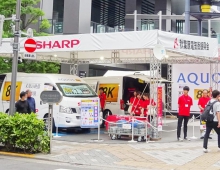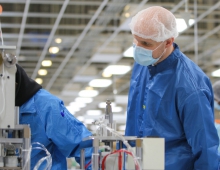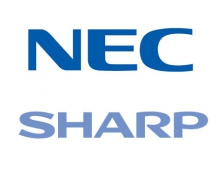
Sharp To Decide On Deal with Hon Hai Later This Month: report
The board of directors of Sharp is expected to decide on a bailout deal with manufacturing giant Hon Hai Precision Industry Co. on Feb. 24 at the earliest, Japan's Nikkei Asian Review reported Friday. The report said that Sharp will hold a board meeting on Feb. 20 to deliberate the deal with Hon Hai, also known as Foxconn. It said the meeting will likely yield a decision on whether to accept the bailout plan four days later.
On Feb. 5, Hon Hai Chairman Terry Gou said that he expects his company would sign an agreement with Sharp on Feb. 29. Gou made the remarks when he visited Sharp's headquarters.
The Taiwanese firm is said to be planning to spend as much as 700 billion Japanese yen (US$6.19 billion) to acquire the company.
Sharp has also received a bailout proposal from the Innovation Network Corp. of Japan (INCJ), which is sponsored by the Japanese government.
The Asahi Shimbun said that Hon Hai has gained the upper hand in negotiations with Sharp.
Foxconn is seeking to take over Sharp because the iPhone assembler needs Sharp's advanced display technology for its new panel plants in China, said David Hsieh, a senior director at research firm IHS DisplaySearch.
Innovation Network Corporation of Japan might use this a key argument for keeping the electronics maker in Japan and preventing its technology from being leaked to Chinese competitors.
Foxconn has recently signed agreements with local officials in Zhengzhou in central China as well as in Guizhou in southwestern China in order build a facilities to make small and medium-sized liquid crystal display (LCD) panels using advanced low-temperature polysilicon (LTPS) technology. LTPS is used in Apple's iPhones, and Sharp is one of the panel suppliers for the U.S. company.
However, there has been speculation that Apple wants to gradually shift to active-matrix organic light-emitting diode (AMOLED) technology. To produce AMOLED panels, a manufacturer first needs to acquire superior LTPS technology, according to Hsieh, due to the fact that AMOLED production still requires LTPS elements.





















